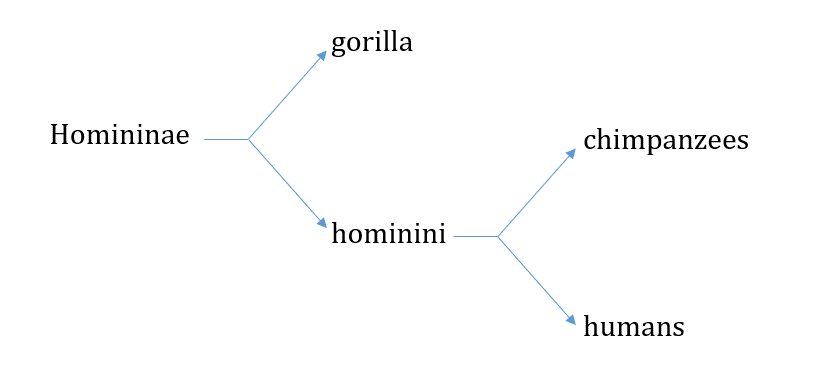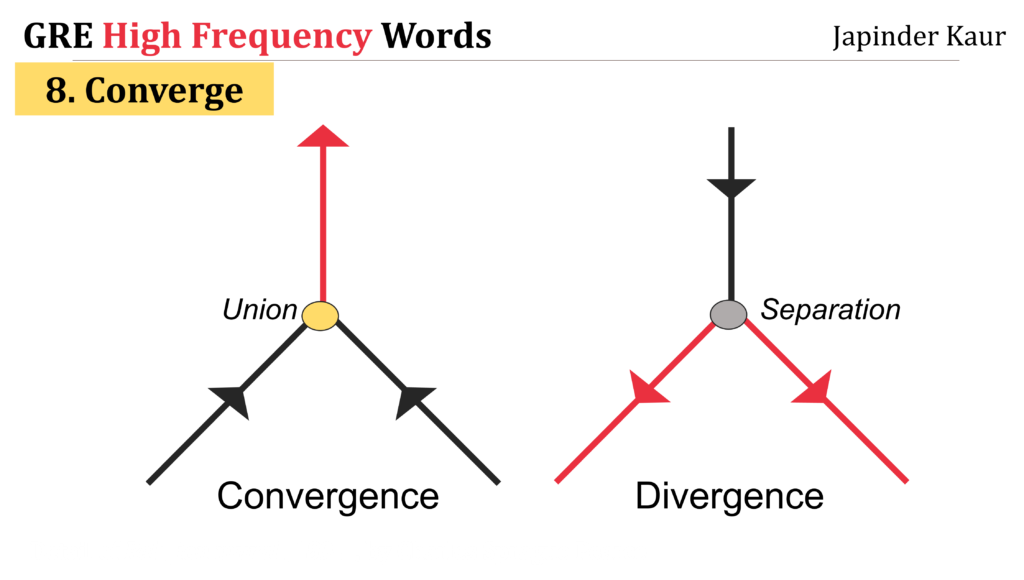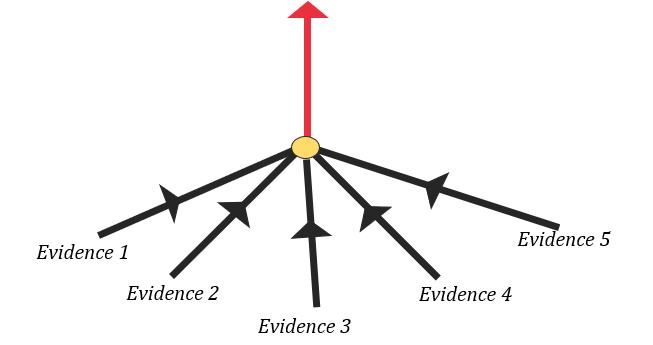Words covered in this article
Ambiguity, Dichotomy, Effrontery, Incongruity, Ephemeral, Prodigal, Diverge, Converge, Ambivalence, Veneration, Reverence
1. Ambiguity
The word ambiguous is used for something that is not clear and potentially confusing, because it can be interpreted in more than one ways.
Noun: Ambiguity.
Occurs in Barron’s High Freq. 333, Magoosh 1000, Manhattan 1000.
The image shown here, drawn by William E. Hill, is ambiguous because it can be seen as either a young woman or an old woman. (Hint: The young woman’s necklace is the old woman’s mouth)
Sentences can be ambiguous too. Example:
“I saw a bat.”
The word ‘saw’ here could either be the past tense of “see” or the present tense of “saw” (‘to cut with a saw’). Further, the word ‘bat’ too could mean either a flying mammal or a sports equipment.
So, without a clarifying context, this sentence could be interpreted in four ways:
- I observed the flying mammal named bat with my eyes.
- I observed the sports equipment named bat with my eyes.
- I cut the flying mammal named bat with a saw.
- I cut the sport equipment named bat with a saw.
Ambiguous sentences can sometimes convey quite funny meanings. For example:
“Last night I shot an elephant in my pajamas. How he got in my pajamas, I’ll never know”
Groucho Marx
The ambiguous sentence below can be interpreted in eight ways:
“I saw a man on a hill with a telescope.”
Can you find them? Give it a shot yourself, and then, compare your answers with mine in this 3-minute video where I have explained ambiguity in still greater detail.
2. Dichotomy

A dichotomy is a division into two mutually exclusive and contrasting categories. It is a binary classification and allows for only two possible values – EITHER this OR that, EITHER 0 OR 1, EITHER True OR False etc.
Occurs in Barron’s High Freq. 333 and Manhattan 1000.
This word is made up of Greek dika (i.e. ‘two’) and tomos (i.e. ‘a cutting’), and so denotes ‘a cutting up into two (parts).’ Similarly, the word ‘binary’ is derived from the Latin word bini, which means ‘comprised of two (parts).’
A division into two parts is called a dichotomy, into three, a trichotomy, and into many, a polytomy. For example, the division of angles is trichotomous – angles are right, acute, or obtuse.
Here are some usage examples of dichotomy:
- The dichotomy of organisms into ‘vertebrates’ and ‘invertebrates’ is based on the classifying question: “Does it have a backbone?”
- We often dichotomize gender into masculine and feminine.
- The dichotomy of “good and evil” is present in most religions and moral traditions.
- The ‘Moral-Practical Dichotomy’ is the belief that the moral and the practical are opposites and mutually exclusive.
- We dichotomize genius into two kinds – natural and learned, and of the two, it is natural brilliance that most of us love, respect and secretly hope for.
I talk about the above explanation of dichotomy in greater detail in this 4.5 minute video.
3. Effrontery
Effrontery means shameless or disrespectful boldness, or a shamelessly bold action that makes the other party feel disrespected.
Occurs in Barron’s High Freq. 333, Magoosh 1000 and Manhattan 1000.

Origin: Latin ex-, out + frons, forehead => ‘to put out one’s forehead’ (such as the girl in the above cartoon is doing – she is sticking her forehead out at the old lady) => rudeness
Effrontery is such an action of a person that makes us feel:
- Either shocked enough to say, “You won’t believe the nerve he has!”
- Or insulted enough to exclaim, “How dare he have the cheek (to do X)?”
The old lady in the above image is likely to tell her friends, “Kids these days have no manners at all. When I asked the little Miss Crawley to not play in the mud, she had the effrontery to stick her tongue out at me!” and shake her head in disappointment at the poor state the world is coming to.
Of course, what the old lady sees as effrontery may seem to little Miss Crawley’s agemates an admirable show of courage against nosy adults. Like beauty, effrontery lies in the eyes of the beholder.
Other Examples:
Treating the plaintiffs’ request that the Supreme Court reverse its decision in a case as an effrontery, the Court reprimanded them severely.
The final line of W.B. Yeats’ poem Fallen Majesty had initially read:
“Once walked a thing that seemed, as it were, a burning cloud.”
When his good friend Ezra Pound suggested that Yeats should remove ‘as it were,’ the poet was furious at Pound’s effrontery. But slowly, Yeats came to realize that Pound was right and forgave him.
Here is a 3.5 minute teaching video for effrontery.
4. Incongruity

The word incongruity means inconsistency, lack of harmony or inappropriateness (with respect to the norm or to another thing).
Occurs in Barron’s High Freq. 333, Magoosh 1000 and Manhattan 1000.
Adjective forms: incongruous and incongruent.
We have learnt in high school math about congruent triangles. Imagine a society of exactly alike (congruent) gray triangles in which one triangle suddenly decides to be an oversized red circle. The result is the image above. Lines made up solely of congruent gray triangles would make a pleasant geometric pattern. Now, the incongruous red circle breaks the harmony of the pattern, and the image hurts our eyes and makes us uneasy.
More examples:
(Meaning: Inconsistency with respect to the norm)
1. It is incongruous to wear torn jeans and a t-shirt to a wedding.
2. It seemed incongruous to most people that a doctor practicing in a small backward village should dream of himself as a scientific discoverer.
(Meaning: Inconsistency with respect to another thing)
1. If the shape of a key is incongruous to that of the cavity of the lock, it is unfit to be called a key.
2. The sadness in her heart seemed incongruous with the brightness of the day outside.
3. The incongruity between her talent and her ambition drove her mad.
5. Ephemeral
Ephemeral means existing for only a day, short-lived.
Occurs in Barron’s High Freq. 333, Magoosh 1000 and Manhattan 1000.


The adjective ephemeral comes from ephemera, the Greek name for dayfly, a winged insect that lives only for one day. Ephemera is now also used in the more general sense of something that is short-lived.
Some opposites of ephemeral are:
immortal, eternal, permanent, long-lasting, enduring.
Usage examples:
1. The body is ephemeral, but the soul is everlasting.
2. Unlike cinema, live theatre is ephemeral and each performance is lost forever.
3. Nature conquers death not by creating eternal organisms but by making it possible for ephemeral ones to reproduce.
4. The term ‘printed ephemera’ describes printed material that has only short-lived relevance and is disposed of upon use, e.g. advertisements, pamphlets, hoardings, bills, tickets, calendars, greeting cards etc.
5. The “Thinking Skills” movement was a fad, an ephemeral idea that interested educators for a moment, generated a great number of journal articles and then withered away.
6. The following couplet is about the ephemerality of human life:
“In this short Life that only lasts an hour
How much – how little – is within our power.”
Emily Dickinson
Here’s the link to the associated 2.5 minutes teaching video for ephemeral.
6. Prodigal

The word prodigal is used, as both an adjective and a noun, for someone who is wasteful of their money (or another valuable resource).
Occurs in Barron’s High Freq. 333, Magoosh 1000 and Manhattan 1000.
You may remember this word with the Biblical story of the prodigal son. A rich farmer once had two sons, of whom the younger one was an entitled brat who asked his father to give him his share in the ancestral property. To make such a demand when one’s father was alive was great rudeness, but the father fulfilled his wish. The spoiled young man unapologetically went away with his money and spent it all in a few years. Only when he had to labor to earn his food did he start to feel sorry for the way he had treated his father. He returned to his father, fell at his feet, and begged the old man to forgive him and to accept him as a laborer on the family farm. The father hugged him and announced a feast to celebrate the return of his son.
So, the prodigal son wasted:
- his money
- precious years of his life
- with his selfish defiance, the bond with his loving father.
Other usage examples:
1. Ms. Lee has renovated her house thrice in three years, to satisfy her prodigal pleasures.
2.
“O man! while in thy early years, how prodigal of time!
Mis-spending all thy precious hours- thy glorious, youthful prime!”
Robert Burns
7. Diverge
To diverge is to go in different directions from a point.

X and Y go together till some point, and then their paths diverge.
Noun form: divergence
Occurs in Barron’s High Freq. 333 and Manhattan 1000.
Origin: Latin dis-, away + vertere, to turn => ‘to turn away’
Two other words that come from the root vertere are:
- Reverse = ‘to turn back’ (L. re-, back).
- Vertebrates = ‘animals that can turn (their head and torso, because they have a spinal cord)’
Usage Examples:
1. White light diverges into seven colors upon passing through a prism.
2. Brought up to the practice of medicine, he diverged to the profession of astrology.
3. We walked mostly on the edge of the river, with a divergence here and there due to muddy patches.
4. Gorillas, humans and chimpanzees have a common ancestor – the Homininae. Around 9 million years ago, the Homininae diverged into the gorilla branch and the hominini branch. Then, about 6 million years ago, the hominini branch further diverged into the chimpanzee and the human lineages.

8. Converge
To converge means to come together (from different directions) at a point.
Two people were walking on their own life-paths. Then they married, and so, their life-paths converged.
Noun form: Convergence
Occurs in Barron’s High Freq. 333 and Manhattan 1000.

Converge is the opposite of word#7, diverge. The root of both these words is the same: the Latin word vertere.
Origin: Latin con-, together + vertere, to turn => ‘to turn together (in the same direction)’
Usage Examples:
1. Multiple lines of evidence converge on the conclusion that drawing can be an effective learning strategy.

2. Light rays go through the lens and converge at a single point.
3. Railroad tracks appear to converge at the horizon.
4. As a team converges on a decision—and especially when the leader tips her hand—public doubts about the wisdom of the planned move are gradually suppressed and eventually come to be treated as proofs of flawed loyalty to the team and its leaders.
5. Though on the surface the pieces of The Waste Land are disconnected, they all converge on a central experience and theme: that we’re living in a spiritual wasteland.
9. Ambivalence
Ambivalence is the state of being in two minds about something. If one part of you wants to do something but another does not want to do it, you are ambivalent.

Occurs in Barron’s High Freq. 333, Magoosh 1000 and Manhattan 1000.
Origin: Latin ambi-, both, + valentia, strength => ‘both sides of the argument (do it/ don’t do it) are equally strong.’
(Note: you have encountered Latin ambi- once before in this article – in Word #1, ambiguous)
The Latin word valentia has a Sanskrit cousin – bal – which sounds similar and means the same. Some Hindi words from the root bal are balwaan (strong), nirbal (weak, without strength or power), and abla (weak, without strength or power).
Usage Examples:
- The poem in the image, written by John Ciardi, is about a man who is ambivalent towards good and evil. His self is divided – one part wants to be good, and the other wants to be bad. Both Dr. Jekyll and Mr. Hyde live in him, as they do in most of us.
- The academic term for the common human desire to have your cake and eat it too is ‘ambivalence of attitude.’
- Public attitudes toward humility are marked by ambivalence. We are taught to not be proud of our achievements or to brag about them, and yet our culture rewards self-promotion far more than humility.
“The definition of ambivalence is watching your mother-in-law drive over a cliff with your new Cadillac.”
David Mamet
10-11. Veneration, Reverence

The words veneration and reverence are exact synonyms. Both mean great respect.
Both words occur in all these three lists: Barron’s High Freq. 333, Magoosh 1000 and Manhattan 1000.
Imagine a Respect Scale, on which you can plot the amount of respect you have for a person or thing. Veneration and reverence will mark the uppermost end of this scale (the max amount of respect), while ‘Insult’ will mark the lower end.
Usage Examples:
- The painting above shows a couple venerating a stone god.
- No one is neutral about Marshal Philippe Petain. He either excites great veneration or great contempt.
- The adjective ‘great’ is actually redundant (i.e. extra, unneeded) in this usage example, because veneration itself means great respect. Also, if you juxtapose this sentence with the Respect Scale mentioned above, you’ll note that the word ‘contempt’ is intended to be placed at the lower end (minima) of the Respect Scale.
- The works of the artists who have stood the test of ages have a claim to that respect and veneration to which no modern can pretend.
- He spoke with great veneration of his spiritual guru.
- Or, he spoke reverently of his spiritual guru.
- The people of every religion treat their holy books with reverence.
- He sat very still, watching her as she talked. And he seemed to listen with reverence.
- He was treated with reverence because we all knew that his madness had given him a prophet’s vision.
- The Indian subcontinent’s reverence for the Peepal and the Banyan trees goes back to ancient times.
